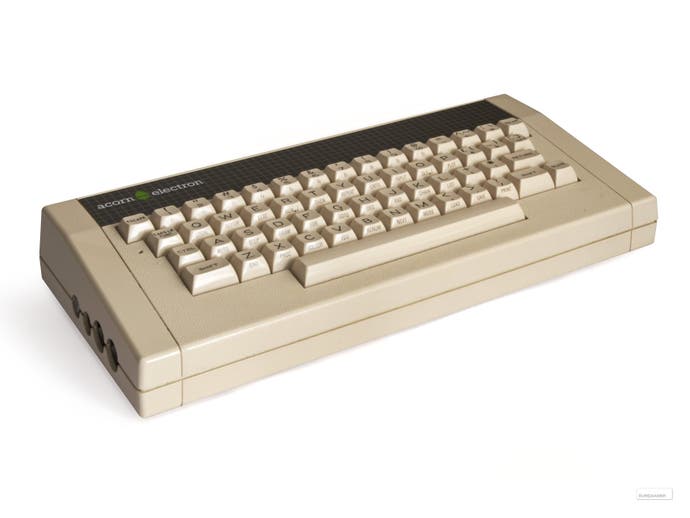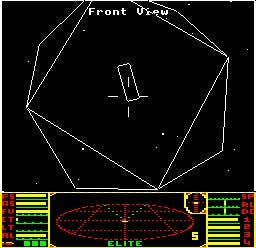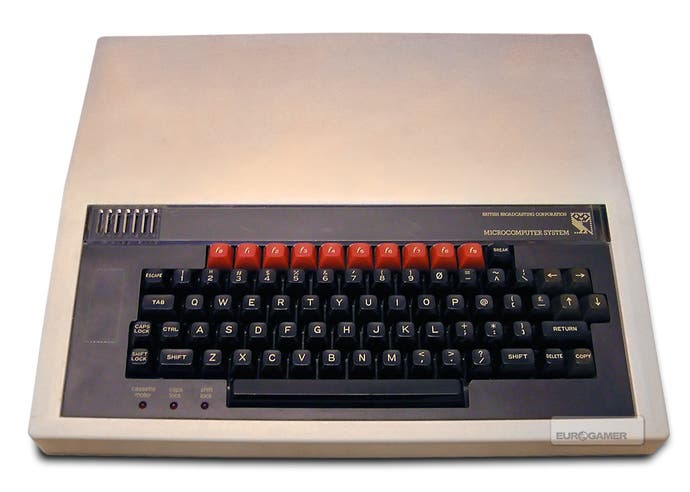The Bold and the Braben
From the archive: The Elite co-creator gets nostalgic
Every Sunday we present a feature from our archives, either for you to discover for the first time or read again. This week it's John Bedford's encounter with Elite co-creator David Braben, who gets surprisingly nostalgic about things.
I can remember my first sickie. Just six years old at the time, even now I can recall overhearing a phone conversation between my mum and dad, with mum explaining my unexpected return home from school. Referencing the listings magazine that had fast become a minor obsession of mine, she wearily offered her grim diagnosis: "Electron User-itis".
So wonderfully crafted was this unintentional subterfuge that I had actually convinced myself that I was too ill to stay at school. But back at home in front of the Acorn Electron, diligently copying code across from the magazine into my primitive computer, I all of a sudden felt much better indeed. It was miraculous.
More than a quarter of a century later I had the good fortune to meet up with David Braben, co-creator of the Elite games, at this year's Develop Conference. In between sessions on full-body motion-tracking and the recreation of Disneyland's vast acreage, we took a few moments to reminisce on those early days of home computing and David's own programming inspirations.
"I suppose I had a fascination with them even before I had a computer," he says, "I read listings and things like that and thought 'Wow!' It just filled me with wonder and the simplicity of it all. I got an Acorn Atom when I was 16 or 17 and it was fantastic. It had everything I needed and that was the beauty."
"You didn't need expensive compilers, you didn't need fancy tools, you didn't need machines that cost several thousand quid."
David Braben, co-creator, Elite
This sense of excitement is something that David wants to engender in the next generation of school-children through the Raspberry Pi project. A micro-computer in the truest sense of the word, it will offer a low-cost entry to the world of computer programming via a device the size of a credit card.
"It had - and this is what we're trying to recreate with Raspberry Pi - that feeling of wonder, that you can't get anything wrong, you can't destroy it. The worst-case scenario was that the thing would crash and you had to press the reset button. Two seconds later you were back with a prompt."
"It had an assembler built in so you had all the tools you needed. You didn't need expensive compilers, you didn't need fancy tools, you didn't need machines that cost several thousand quid. Also, if you didn't know what you were doing, you couldn't break it."

There was certainly a beguiling simplicity and intrigue about the communication and control of the machine. While complex game programmes were beyond my own abilities at the time, simply breathing life into the simplest of graphics generators or tweaking the creations of others was an exhilarating experience. It was a feeling of joyful discovery that David shared.
"I had a sense of wonder when I first got a computer," he explains,"One of the first things I wrote in BASIC was an expanding star-field because I thought you should be able to do that. There was no persistence and that was one of the incentives for me to learn assembly."
"I also wrote, would you believe, a database programme which initially started off as something I just typed in. But it was amazing how you could get so much perceived complexity from something that was only about 6 lines of code. I learnt so much from it but it also sparked my imagination to think you could create other things with that, worlds"
The philosophy of economy was perfectly encapsulated in the regular 10 Liners feature of the Electron User magazine. From rudimentary - yet complete - games, to graphical "showcases", contributors would compete to produce the most impressive coding results within a strict limit of just ten lines.
This self-enforced restriction to provide the greatest bang for the smallest buck - efficiency over the exploitation of raw power - was a product of a scavenging mentality that sought to gain ever more from a meagre well. I wanted to ask David whether he felt as though that ingenuity was a skill that's been lost in a world of tools, libraries and an embarrassment of processing riches.
"I think it's a different kind of ingenuity. What we had then was squeezing out the last element of horsepower." says David,"When you move from a platform of 32K memory to a platform with 4MB, that was such a big change - it was a prototype Archimedes and it was just completely different. But initially we had the same mindset and it takes a while to realise you can do whole different things. Today it's just preposterous: the amount of storage, the amount of performance, the raw power that you have."
Elite famously made a virtue out of necessity, putting the BBC Micro's architecture to highly inventive use. It raises the question of whether creative opportunities are enhanced by the inherent limitations of a system rather than restricted.
"We really did eke out every last drop [of the BBC Micro]. I don't think we're anywhere near that with the 360."
David Braben
"It's not the restrictions. Yes, they require creativity to really get that last bit of juice, but every platform has restrictions: a 360 has restrictions in that everything is finite, whether it's a 360, a PS3, a Wii or a Wii-U"
"There's no question that Elite pushed what the BBC Micro could do very hard, and what's interesting is that after Elite there wasn't that same progression. We really did eke out every last drop. I don't think we're anywhere near that with the 360."
"What was really great about the BBC Micro is the fact that it did have an operating system and you could provide services to the operating system. So you could register yourself as being a keyboard driver, or a print driver and that meant you could do all of those things - we could use the OS's memory."

When it comes to reminiscing on the value of games in the eighties David takes a different, less rose-tinted view to my own.
"Nostalgia is a terrible thing, people remember the good things and forget the bad. People always say the games in the eighties were all great - no they weren't! Most of them were rubbish, but we remember the ones that stood out because they were good!"
We also can't forget that for all the accessibility, simplicity and modularity of this wonderful robotic slave that children and adults alike could experiment with, there was - almost repressed from memory - a darker side to the scene.
Following a week of after-school typing of a magazine listing that would ultimately simulate a game of bridge, there would inevitably follow a weekend of meticulous, painstaking cross-checking between code and console in order to track down and eliminate the ever-shifting error - all the while muttering a steady stream of BASIC under my breath. It's a wonder my parents didn't call in an exorcist.
And once all that effort had been expended you would - if you were extremely lucky - arrive triumphantly at a different syntax error.
Talking to David about this, he laughs."We all had that, but that learning experience, that feeling of exploration, the fact that you are very much in control of the destiny. I learned a prestigious amount - not taught in the traditional sense - but it just allowed me to experiment creatively. The nearest equivalent is Lego, where a kid can just make stuff. It's amazing, and you'd think you couldn't make it out of bytes or Lego but it's just lovely to create something."
"From the early days I wanted to do 3D and the first fully 3D thing that I did - all in assembler - was the graphics for a game that I started putting together. It had four ships: Ship 1, Ship 2, Ship 3 and Ship 4. If you look at the source code of Elite, the ships we now know as Cobra, Python, Sidewinder and so on are all called Ship 1, Ship 2. They existed long before in a [different] programme."

"But the problem is, that particular game turned out to be really dull because once you'd shot one, you had a score, and I didn't find that compelling. Then I met Ian Bell, and he had a BBC Micro. I'd written a lot of code so that I could run BBC Micro code on the ATOM and that's how we built Elite in the early stages."
This collaboration reminds me of a feeling of involvement in the games scene, when amateur-coding players and games designers were able to talk to the same machines in the same languages - albeit to differing degrees of success. Is it right to say that something's been lost between players and developers in the race towards ever-increasing complexity
"I don't agree. I think there's been more of a remove itself, but if you look at the user-generated content in games like Rollercoaster Tycoon and LittleBigPlanet. I think it's very interesting where the community sort of forms around the game and builds content for it and embraces it. I think that's really healthy as well."
He's right of course. Technologically the world of gaming has moved on and the hobby is richer for it. But that instinct to not just participate, but create within these worlds still holds - only the methods have changed. The future of user-generated content in gaming is certainly looking rosy, but for me it's history will always be a fondly remembered shade of beige.








